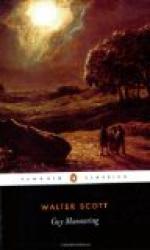Certain qualms of feeling had deterred Ellangowan from attending in person to see his tenants expelled. He left the executive part of the business to the officers of the law, under the immediate direction of Frank Kennedy, a supervisor, or riding-officer, belonging to the excise, who had of late become intimate at the Place, and of whom we shall have more to say in the next chapter. Mr. Bertram himself chose that day to make a visit to a friend at some distance. But it so happened, notwithstanding his precautions, that he could not avoid meeting his late tenants during their retreat from his property.
It was in a hollow way, near the top of a steep ascent, upon the verge of the Ellangowan estate, that Mr. Bertram met the gipsy procession. Four or five men formed the advanced guard, wrapped in long loose great-coats that hid their tall slender figures, as the large slouched hats, drawn over their brows, concealed their wild features, dark eyes, and swarthy faces. Two of them carried long fowling-pieces, one wore a broadsword without a sheath, and all had the Highland dirk, though they did not wear that weapon openly or ostentatiously. Behind them followed the train of laden asses, and small carts or tumblers, as they were called in that country, on which were laid the decrepit and the helpless, the aged and infant part of the exiled community. The women in their red cloaks and straw hats, the elder children with bare heads and bare feet, and almost naked bodies, had the immediate care of the little caravan. The road was narrow, running between two broken banks of sand, and Mr. Bertram’s servant rode forward, smacking his whip with an air of authority, and motioning to the drivers to allow free passage to their betters. His signal was unattended to. He then called to the men who lounged idly on before, ’Stand to your beasts’ heads, and make room for the Laird to pass.’
‘He shall have his share of the road,’ answered a male gipsy from under his slouched and large-brimmed hat, and without raising his face, ’and he shall have nae mair; the highway is as free to our cuddies as to his gelding.’




